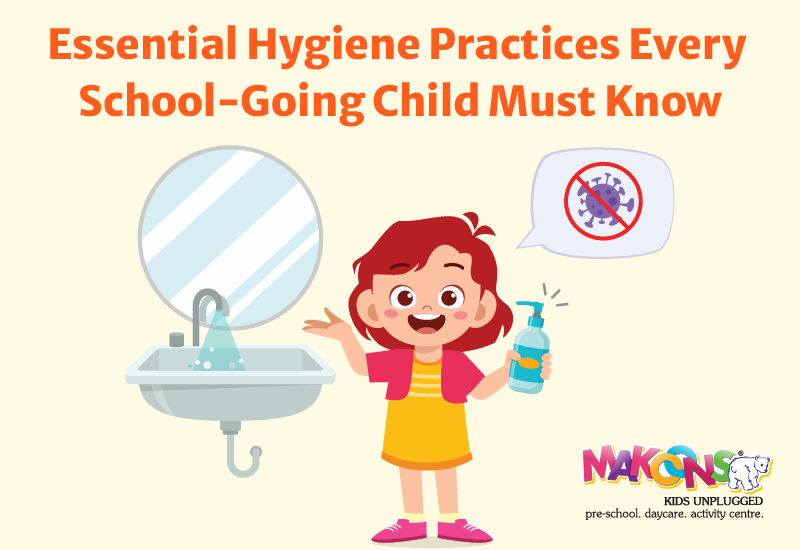School is a place where we socialise and engage in a lot of fun practices. It’s a place where we meet new people, which gives us a reason to always be careful and be hygienic to be healthy and clean.
Hygiene maintenance is seen as important for kids on joining a school. This is since it enables them to do their best, and also for their physical well-being and health. If kids maintain themselves neat, they will not fall sick and thus attend school less often. A neat student feels comfortable about himself and thus can focus on his assignments.
Why School Hygiene Tips Are So Important?
Schools congregate a great number of children in a common environment where they share common classrooms, playgrounds, and facilities. Therefore, it is easy for germs to be transmitted from one child to another. Typical fever, cold, cough, influenza, and gastro viruses may spread within a school. However, students can guard themselves and their peers against becoming ill by applying correct hygiene procedures.
Learning about hygiene also makes the children imbibe these habits. Children learn these essential skills early, and these become a part of their natural habit once they grow up.
Hand Washing: The Most Important Hygiene Habit
Proper hand washing is what a child can include as a very important everyday practice to keep them clean and healthy. Each day, what a child’s hands touch is amazing; they use the desks, the doorknobs, play on outdoor structures at the school, and use the same supplies as the other students. All of those surfaces have germs that cause illness. That is why we stress the importance of hand washing, use of warm water and soap for at least 20 seconds to protect health. Also that they must clean out all areas of the hands in between fingers, under nails, and around the wrist.
Important times for washing the hands are:
- Before lunch or snacks
- After the bathroom
- After being outside
- Before and after handling shared classroom objects
This easy practice makes such a big difference in maintaining everyone’s health at school and home!
Dental Care That Makes a Difference
Kids need to have clean, healthy gums and teeth more than anything else. We think kids should clean their teeth before school in the morning and before bed at night. A 2-minute tooth brushing with fluoride paste not only removes problem food particles that lead to cavities and bad breath but also allows kids to improve their self-confidence by eating well, speaking easily, and smiling freely.
Children should also be reminded to spit out water after lunch in school, if not possible, rinse their mouths with water after school lunch. Some schools even permit children to bring miniature travel toothbrushes with them to use after school lunch, although this is an optional feature.
Hair Care Made Easy
Keeping a child’s hair clean is another crucial part of their hygiene routine. Since childhood, hair washing is something that we have in our routines. Make sure your child takes up to this habit as well as being hygienic. Active kids like athletes should wash their garments more frequently that protect themselves from any skin rashes. A gentle wash and condition might help maintain their hair fresh and in good condition.
Kids are more self-assured and prepared to learn when they have neat hair for school. Hairstyles that are simple to manage and keep hair out of the face are most suitable for learning and play, as well as for minimizing prevalent school problems and head lice.
Nail Care for Healthy Hands
Maintaining fingernails as short and clean as can be is one extremely important, yet easily forgotten, aspect of the personal hygiene of children. Bacteria and germs grow best on dirty or long fingernails. You should clip your kids’ nails often and tell them to rinse their hands with water alongside soap, especially under their nails.
This simple habit keeps infections on kids’ nails from spreading when they contact food or their skin.
Hygiene of School Clothes and Supplies
Going to school with clean clothes is a significant aspect of healthy school hygiene. Kids should always wear clean clothing each day for school. Bacteria generally survive on stinky clothes and can cause rashes. Clean bottoms and socks are necessary to remain stink-free and healthy.
The main thing is to keep the study material germ-free. All kinds of boxes, such as pencils or tiffin boxes, need to be cleaned daily to maintain the child’s good health. A simple wipe-down can help keep these items fresh and clean.
Developing Healthy Bathroom Habits
Kids should be properly trained about keeping the school washroom clean even after use. They must wash their hands with soap, and better flush when they are finished. They should avoid touching any other areas. These traditions keep the bathrooms clean for all.
Children should notify a teacher if there is no toilet paper available, instead of resorting to skipping good bathroom hygiene. Learning these manners makes children responsible for keeping themselves clean and leads to a healthier school environment.
Building Confidence Through Cleanliness
When we follow a good diet, we feel good about ourselves. When children practice a healthy daily school hygiene routine, they tend to feel more confident around others and can learn better.
Being clean is also a manner of respecting other people. If children keep themselves clean, they are showing respect to their teachers and fellow students, which helps create a happy and healthy school for all.
Conclusion
Children attaining habits for personal hygiene at a young age helps them with the awareness, self esteem they might lack. Little habits like washing hands after every meal, or Taking good bath keep them away from diseases and help them to maintain health.
Parents and teachers impart children with the ability to sustain good health throughout their school years and a lifetime by making these habits of hygiene a way of life. Proper hygiene is not difficult; it takes effort and time to perform. If children are taught these fundamental school hygiene practices, they are set to enjoy themselves, learn, and develop in a healthy, confident manner.
Read more : Top 10 Activities to Improve Your Child’s Imagination Power


